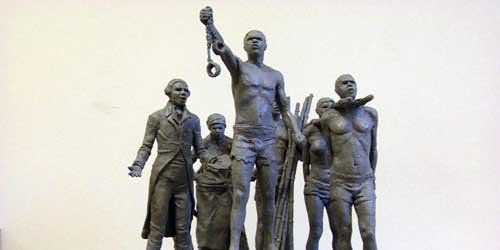
Historic involvement in slavery is a very painful, significant, and – until recently – underexposed part of our shared history. As of next year, extra attention will be paid to this history throughout the Kingdom: the Slavery Memorial Year will run from the 1st of July 2023 until the 1st of July 2024.
For over 300 years, slave traders (including many Dutch slave traders) captured adults and children from parts of Africa and transported them across the Atlantic Ocean in degrading conditions to the Netherlands’ various former colonies: Suriname and the Caribbean islands of Aruba, Bonaire, Curaçao, Saba, Sint Eustatius and Sint Maarten. Even the original inhabitants of the various Dutch colonies were not spared. In Asia, enslaved people were transported to regions controlled by the United East India Company (VOC). People were born into slavery for many generations. They spent their entire lives performing forced labor for Dutch plantation owners.
On the 1st of July 1863, slavery was abolished by law in Suriname and the Caribbean islands, which were colonies of the Kingdom of the Netherlands at the time. And yet a sizeable proportion of those who had been enslaved had to continue working on the plantations under state supervision for another decade in order to mitigate the ‘harmful effects of this measure’ on plantation holders. Hence for many people in the kingdom back then, the de facto abolition of slavery did not come until 1873. That will be 150 years ago on the 1st of July 2023.
From 1858 until long after 1873, contract labor also subjected people from Asia to hard labor in Suriname under Dutch colonial rule.
During the Memorial Year, the Kingdom of the Netherlands will be reflecting on this embarrassing history as well as on how this history still adversely impacts the lives of people today. The Government is supporting initiatives set up by or in partnership with the various groups and communities affected by our historical role in the slave trade. The Slave Trade Remembrance Year will thus be a year for the people and by the people.
The grant schemes
June and July 2023 will mark the grand opening of the Slavery Memorial Year across the Kingdom, and July 2024 will mark its close. Through this memorial year, the Government of the Netherlands hopes to contribute to permanently increasing knowledge and interconnectivity within society.
In addition, the Cabinet will make two million euros available for the organization of activities during Slavery Memorial Year by, for example, community organizations and cultural institutions. This will enable larger institutions and small local initiatives or individuals alike to apply for funding to organize social and/or cultural activities. This will be conducted through two cultural funds: The Mondrian Fund and the Cultural Participation Fund.
Initiators such as museums, theatres and archives, as well as private initiators such as artists, creatives or organizers, can apply for funding to organize an activity during the Slavery Memorial Year. The Mondriaan Fund and the Cultural Participation Fund will assess the applications independently, through a representative assessment committee with knowledge of historic slavery and the communities involved. Anyone in the Kingdom wishing to organize an activity as part of the Slavery Memorial Year can apply. Information can be found on the websites of the Mondriaan Fund and the Cultural Participation Fund
RCN

 Saba News News and Information from Saba Island, Dutch Caribbean
Saba News News and Information from Saba Island, Dutch Caribbean
